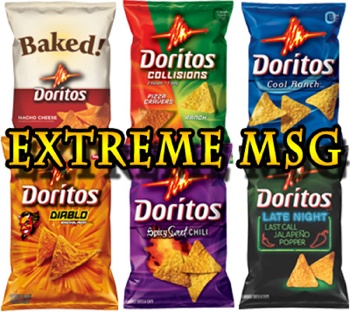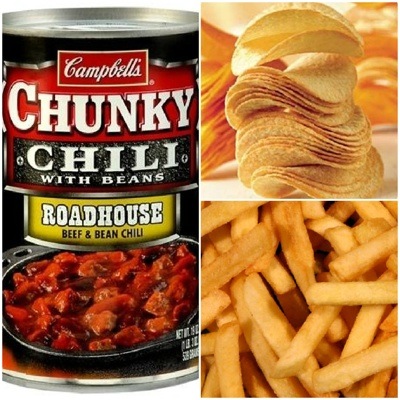Eating processed foods is a real doozy. They are not only toxic in nature, but are also so addictive that they cause you to crave more of the very food that’s so bad for you! Remember the public outcry when the news came out that tobacco companies added ingredients that made cigarettes even more addictive? Unfortunately, food manufacturers also add addictive substances to their foods, but there isn’t enough public momentum (yet) to force them to stop. So sadly, these items continually contribute to us getting fatter and fatter and sicker and sicker as a society.
Even foods that are considered “healthy,” like bread, pasta sauce, and salad dressing, may contain these ingredients. Let’s look at some of the worst offenders.
Bisphenol-A (BPA)
What it is: BPA is a chemical compound that mimics hormones and disrupts the endocrine system in the human body.

- Canned foods
- Foods packaged in plastics
- Water bottles
- Juice bottles
What’s wrong with it: As I stated early, BPA is an endocrine disrupter that can interfere with your body’s hormones. According to an article in Scientific American, rodent studies have linked BPA exposure to a host of health problems in mammals, including male genital defects, early onset puberty, obesity, behavioral problems, and certain types of reproductive cancers. A brand new study published in the Proceedings of the National Academy of Sciences also links BPA to breast cancer in monkeys.
Acrylamide
What it is: A chemical used to build copolymers and other industrial materials.
What it’s in: Acrylamide has been found in numerous starchy foods cooked at high temperatures. Foods with acrylamide include:
- Potato chips
- French fries
- Bread
- Cookies
- Corn chips
- Pop corn
- Pretzels
- Brewed coffee
- Pies and cakes
- Peanut butter
- Soup mixes
- Canned chili
- Deep fried foods
What’s wrong with it: High, continuous acrylamide exposure has been linked to several forms of cancer. One Swedish study linked acrylamide intake to ovarian and uterine cancer. Other health risks include:
- Nerve damage
- DNA mutation
- Alzheimer’s
MSG
What it is: Monosodium glutamate is a processed chemical used to enhance flavors and increase the presence of “umami” in processed foods.

MSG is present in many savory foods, including:
- Chips and crackers
- Fast foods
- Soups
- Canned foods
- Hydrolyzed vegetable protein (found in many processed foods)
What’s wrong with it: According to some research, MSG is an excitotoxin. When you consume it, it excites your brain cells to the point of death. Excitotoxins also promote cancer growth and metastasis.
Avoiding Toxins
How can you avoid these toxic items? Cut out or down to a bare minimum processed foods, fast foods, animal products, and soft drinks.
I know it may seem like a lot when you’re just starting out and have been used to eating a certain way for a long time, but just start taking baby steps and soon you will feel better on fresh food so that you won’t want to go back. For instance, you can switch to frozen veggies instead of canned ones, if you don’t have time to shop for fresh all the time. You can also make a green smoothie ahead of time before your next meal. And on the go, snack on sunflower seeds or crunchy veggies sticks with salsa instead of processed crackers. Or at least switch to an organic whole grain cracker brand, like Mary’s Gone Crackers, which is a step up. Baby steps= feeling better= long-term progress. And that is what I want for you.
High-fructose Corn Syrup
What it is: Maybe you can recall a TV commercial you’ve seen lately of parents and children skipping through the corn fields (la di daaa!) in pretty outfits and smiles all around, touting that HFCS is the same to your body as sugar. But it’s not straight sugar. High-fructose corn syrup (HFCS or “corn sugar”) is a chemically manufactured sweetener that uses enzymes to convert corn’s naturally occurring glucose into fructose, which is far sweeter. Food manufacturers use HFCS as a cheap way to add a little sweetness to their product, a flavor enhancer, and to brown baked goods.
What it’s in: A better question might be what ISN’T it in. HFCS is nearly ubiquitous in processed foods. Here are just a few of the many foods that may contain HFCS
Salad dressing
- Breads and other baked goods
- Jarred and canned spaghetti sauce
- Salsa
- Juice
- Cereal
- Cookies
- Crackers
- Yogurt
- Frozen meals
- Soft drinks
- Cough syrup
What’s wrong with it: HFCS is associated with multiple negative health effects. First, let’s start with the fact it is a chemically altered food, and one that our ancestors surely did not eat. Because of this, the human body is poorly equipped to process HFCS.

Fructose also has a negative effect on the liver. A study in the Journal of Hepatology concluded that excess dietary fructose consumption was a factor in the development on non-alcoholic fatty liver disease.
Unfortunately, HFCS and other intense sweeteners may be addictive, as well. One study demonstrated that intense sweetness from sweeteners like HFCS surpassed the rewards in the human brain of cocaine, a highly addictive drug. Unfortunately, because HFCS is in so many processed foods, this means that it may trigger addictions to many of the unhealthy chemicals they contain.



 Salad dressing
Salad dressing
Great article Kim, since I am working in the US ,I am from Germany, I stay clearly out of American made processed and chemical saturated Foods,sadly to see that many of my Patients and co workers are addicted to these kind of Foods.
You need better Control in Food Production like we have in Germany and through out the EU, of course we are not free of problems ,too.
Sure we have Fast Food, but places like McDonald’s is only visit by the younger Generation,you find hardly older or old people visiting joints like that. and many more cook their Food at home .
Going out for Dinner is considered a Treat in my Home Country and not a necessity
Restaurant Food but also Hospital Food is high in Sodium,Fat, and chemical By Products.
Kim , keep the good Work up and keep the Information rolling.much more has to be done to get People
People educated about what and how to choose the right Food for themselves and their Families
hi barbara
that is not really true – been to germany and saw lots of stands on the streets where they sell bad foods, i.e. sausages (which the germans seem to die for), french fries and to make it worse top it with globs of mayo and stuff like that. i have seen many, many overweight people old and young. also the supermarkets look just as bad with their selection of chips, cookies, candy and sodas; did not really notice a difference to the stores here in the us.
it is like kim said – try to stay away as much as possible from animal foods, processed foods and sugars, no matter what country you live in.
thanks for educating people about their food choices, great work!!
ps: have you seen the movie “forks over knives”?? great educational movie and a huge eye opener!!
Hi Edie,
I live in France and I know most of the Central and Southern EU food offer. It is also bad here but the Legislation is much stricter on what can be added to food. For example artificial colors which are allowed in US are banned here. Corn syrup is very rarely used. Also fast food is not as common here. Most of my family have never visited Fast food restaurant. I see people in supermarkets in France check the labels BUT the companies are getting sneaky in their advertising claims. It is not easy anywhere.
Will acrylamide be included on ingredient lists? Thanks!
Thank you for posting on “Hydrolyzed vegetable protein “. Its crazy how many people do not know about this MSG in disguise. I have even been in conversation with people talking about how they avoid MSG and how bad it is for you, as they are eating “Hydrolyzed vegetable(mostly soy) protein” right in as we spoke.
“Genetic Roulette” the movie is playing for free right now on line, sponsored by the insitute for responsible technology – its an amazing educational documentary on the impact GMO’s are having on our food system and how harmful they are to our children!! its scary but an important film to watch for the sake of our families. Kimberly – maybe you could include the link (https://geneticroulettemovie.com/) in one of your blog posts? Thank you!
Okay, I won’t go out for dinner tonight. I will make your Alkaline Grain Veggie Burgers, which taste good but take time to do all the chopping.
Thank you for this list.
I’ve known about the dangers of High Fructose Corn Syrup for a while. I’ve been able to stay away from it when grocery shopping, but I won’t lie: it’s not easy.
My ex and I became crazy about avoiding HFCS in our drinks and beverages. That stuff is like a liquid roach – it’s roaming the Earth relentlessly thanks to the ease of production and the fact that so many of us aren’t aware of what we’re eating.
How can we get involved in making our manufacturers quit using these products? I know that one of the best ways is to stop buying the products, but there must be a movement going on somewhere that we could get involved in? It would be unrealistic to think we could force our younger generation to stop buying chips & soft drinks. We need for the manufacturers to be more responsible too. Also nutritional education in our schools. Thank you Kim for all your research & hard work.
Hello Kim,
Thank you for all interesting topics. Please lett me know what you thing about Pop corn if is homemade with Pop corn machine?Do you thing that contain-Acrylamide? Thank you,have a wonderful week.
I would just like to say thanks for this well written article, I hope you don’t mind me adding it to my collection which can be found on my blog – http://www.cindyscanceraid.blogspot.co.uk please let me know if you would rather I didn’t.